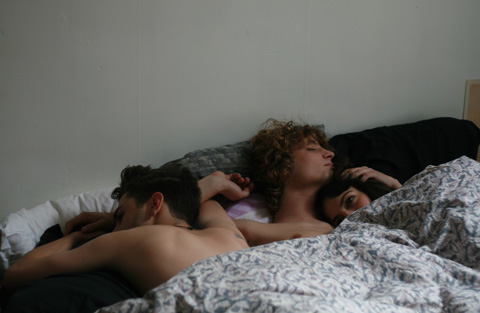
WITH REASON A film about the fetishization of love and desire, Heartbeats itself turns into a catalogue of fetishes, of fashion choices, hairstyles, postmodern cultural mash-ups. |
The titles of 21-year-old Québecois auteur Xavier Dolan's first two films reflect a change in tone and intensity. From the tabloid provocation of his terrific debut, I Killed My Mother, to the generic geniality of Heartbeats, he's dialed down the urgency — not to mention the emotional and intellectual ferment. The new one is a palate cleanser of a movie: unfrenetic, reflective, even melancholy. Although it opens with a quote from Alfred de Musset praising "love without reason," by the end, the movie is more about reasons than love.
This analytical, if not cynical, point of view comes through more clearly in the original French title, Les amours imaginaires, or "Imaginary Loves," a state of delusional besottedness suffered by just about everyone in the film except for Nicolas (Niels Schneider). Nico is the object of desire. Languid, gorgeous, perhaps heartless, resembling Michelangelo's David by way of the adolescent cherub who torments Dirk Bogarde in Death in Venice, he is summed up at a party by an aloofly appreciative Marie (Monia Chokri). "Who is that self-satisfied Adonis?" she asks her best friend, Francis (Dolan).
The question is rhetorical, as who Nico is proves less important than what they make him out to be. At first, Marie and Francis engage in an unspoken La liaisons dangereuses–like competition to bag Nico as a trophy. But they quickly succumb to their prey, devolving from snarky observers to hapless obsessives, and the elusive Nicolas plays along, never tipping his true feelings, his sexual inclinations — or whether he possesses either.
This inert triangle plays out in a series of tableaux, with the three lounging about — two of them torn by longing, one serene in his sphinx-like bemusement — in various louche, nicely appointed settings: a couch, a breakfast table, a bed. They chat and gaze but make no contact. Not as far as Nico is concerned, at any rate. As for Marie and Francis, their shared crush brings them into a conflict that flares up when the three share a weekend at a country house. Isolated and diminished by the stark landscape, they're overtaken by their mean, desperate need, and it isn't pretty.
A film about the fetishization of love and desire, Heartbeats itself turns into a catalogue of fetishes, of fashion choices, hairstyles, postmodern cultural mash-ups. Audrey Hepburn is an iconic favorite, inspiring a coif, a bad play, and some retro clothing about which Francis comments, "Some styles should not be revived." Elsewhere, the film drifts into a collection of scenes evoking scenes from other movies, from François Truffaut to Wong Kar-wei, films Dolan has irritably denied having been influenced by or even having seen.
Heartbeats is lovely to look at, whether it's the montages of beautifully dressed beautiful people walking in slow motion while a French cover of "Bang Bang" plays on the soundtrack or Marie and Francis in frustrating love scenes with Nico substitutes that are lit blue and red and backed by Bach. Dolan's film is a portrait of the artist suffering from ennui who's tired of narcissism and moved to transform someone else's solipsistic malaise into a romantic ideal. It captures that aching period when self-regard and hypersensitivity no longer satisfy and something more is needed. Maybe the director's next picture will be that something more.